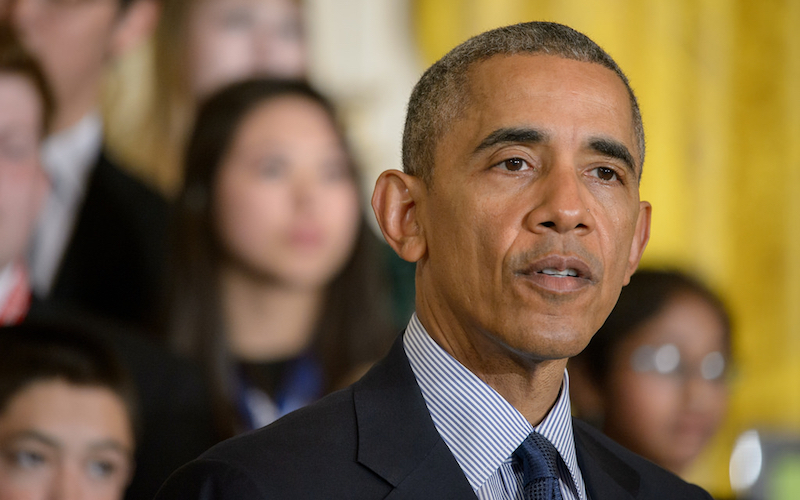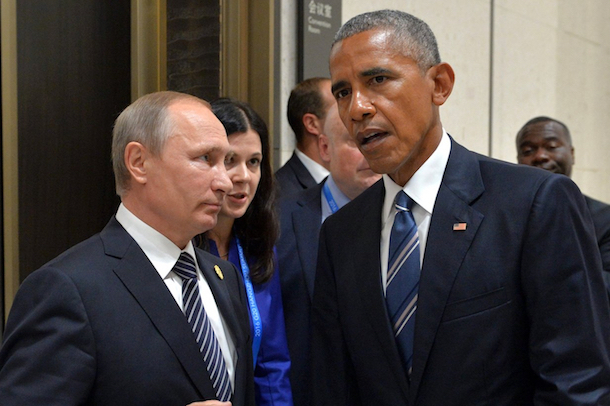
The Fall of Aleppo, the Rise of Russia, and the Failure of Imagination of the Obama Administration
The images are haunting, hard to shake: a shell-shocked child seated primly in the back of an ambulance, covered in plaster, his hair askew and a patch of dried blood on his forehead; the broad streets and towering buildings of a once-proud, vibrant, ancient city crushed into little more than gravel; a column of hollow-eyed refugees miles long trudging across the barren moonscape of northern Syria.
This is the reality of Syria after five years of war involving U.S. proxy forces, U.S.-backed Syrian rebels–including groups from ISIS and al-Qaeda, forces loyal to the government of Syria, and, in a deeply disturbing development over the last year, Russian forces.
Major news agencies have recently reported that, with a big assist from Vladimir Putin, troops loyal to President Bashar al-Assad have retaken areas of eastern Aleppo for the first time since 2012–but that doesn’t mean the fighting is over. Rebels left behind a bomb in a school from which they fled under a cease-fire agreement, injuring three people. Another group of rebels in Damascus blew up a water pipeline forcing water cuts to the capital city for a few days.
And although for a time it seemed as though an uneasy type of peace was emerging as both Assad’s forces and Russian troops stood down, allowing tens of thousands of residents and rebels to clear the area, it is hardly a safe peace.
Nor is it a stable one: Russian and Syrian air strikes resumed shortly after the brief respite in fighting, bombing a rebel-held town just outside of Aleppo called Atareb. Various reports say that a family group of five to seven people was killed by the bombing.
The dead include a civilian father and his young daughter.
As Assad mops up the remaining rebel-held enclaves, we can certainly mourn for the dead as well as for the utter ruin of a great city dating back to antiquity. But perhaps more importantly we must look to the future and prepare for what is to come: a much more dangerous world in which Russia’s expanded influence and ability to strike in Europe and the rest of the Middle East is greatly enhanced.
And we have not only Putin to thank for this new reality on the ground, but the Obama administration as well.
What Putin has done is to pull off a double-edged coup: not only has he stabilized the government of an ally in the region, one of the few he has remaining there. He also, in one fell swoop defanged the much-vaunted American military, completely undermined the long-assumed ability of the U.S. to dictate to the rest of the world how things are going to be, whether it be through the subterranean prodding of the CIA and its operatives or through the overt, brute strength of our overwhelmingly superior military might.
Putin has exposed not only the Obama administration but the entire American Empire project as hollow and feckless, a toothless giant stripped of its ability to effect change the way it once did: through intimidation, sanctions, subversion and finally muscle.
It is an alarming development, and it does not bode well for the ability of future administrations to project American power into other parts of the world; as every kid on the playground eventually learns, once the threat of a bigger, stronger opponent has been exposed as hollow, no one fears him anymore.

However, in the process Putin has also tipped his hand. From his actions we can infer certain possible future actions he might undertake. And while that picture is frightening indeed, especially for Europe, having some notion of what direction he might go gives us time to take a clear-eyed view of where he stands, and where we stand in relation to him.
But let’s face facts: the news is not good. In Syria, Putin shows no remorse about ruthlessly bombing civilian areas, no qualms about cavalierly destroying civilian infrastructure, going so far as to impose a siege on areas in which families are trapped and unable to leave for fear of being shot or bombed and have no access to food and water. Civilian pain and death are apparently non-issues to him.
Further, Russian forces and Syrian forces have shown no compunction about bombing hospitals, clinics, schools and apartment buildings, using barrel bombs as well as cluster bombs, the latter of which are outlawed by international law. The intensity of the bombings has driven the terrified residents to literally live underground in a series of warren-like tunnels under the city.
Remember too that Putin annexed the Black Sea region of the Crimean Peninsula from Ukraine in 2014. This, along with the partnership of his new bestie Assad in Syria give him two solid toe-holds just on the edges of Europe, should he choose to pivot his attentions that way.
And there is no reason to think that he fears such a move. The tension in Ukraine continues to grow, and with a Trump presidency in the offing, Putin will be emboldened, given their close relationship. For their part, leaders of Baltic countries Latvia, Estonia and Lithuania have responded to the potential threat by stepping up military spending sharply.
At the same time, realistic observers of foreign affairs soberly note that there is no world in which the combined militaries of those three nations could offer even mild resistance to a full-throated attack from the Russian bear. For reference, according to estimates by the Latvian government’s intelligence agencies, there are some 200,000 Russian troops amassed just across the Latvian border. Compare that with the 5,000 or so professional soldiers Latvia employs and you can understand why people high up in the military acknowledge that they would be a mere “speed bump” should Russia decide to flex its muscle further in the region.
But back to Syria. This emerging new Cold War–which many fear could turn hot very quickly–didn’t develop in a vacuum. U.S. involvement in Syria under the Obama administration has been staggeringly inept from day one, a series of missteps and reversals and self-contradictory policies that have left the region far worse off than it was before we started poking our nose in.
What has long been termed a “civil war” is hardly limited to factions of Syrians fighting for control. The conflict has been manipulated from the outset by the CIA and other U.S. advisors at the direction of President Obama and his generals, as well as by those running the U.S. intelligence community.
This is of course nothing new. Manipulating the internal politics and squabbles of other nations has a long and ignoble history of echoed whispers in the back hallways of Washington shadier agencies. But the stunning incompetence with which they have attempted to influence events in Syria will go down in U.S. history as ranking among the biggest foreign policy blunders of all time, right up there with the overthrow of Muammar Gaddafi in Libya and the ongoing Iraq debacle, which is now well into its second decade.
These CIA advisors have worked and are still working with a variety of groups like ISIS and al-Qaeda who are ostensibly our enemies in the “war on terror”–as the ongoing overseas adventurism is called these days–prompting many to question just what the point is in fighting such a “war” if we are able to put aside our differences at the drop of a hat and fight alongside these supposed sworn enemies.
From bold presidential cries of “Assad Must Go” in 2013 to the current quagmire in which Russia clearly has the upper hand–with, not incidentally, all of this taking place over the bodies and the untold pain and suffering of the Syrian people in the interim–the Obama team has screwed the pooch on Syria in every way imaginable. Most recently those mistakes include declining to face head-on the challenges of Russian interference in the fight, choosing to back flaccid U.N. peace talks instead of stepping up aid to the rebels.
And while avoiding a full-fledged proxy war with Russia might sound like a positive, there are a couple of problems with this course of action, problems that will only exacerbate and prolong the suffering of the Syrian people.
For one thing, as mentioned previously Syrian and Russian planes continue to drop bombs on areas thought to be hiding terrorists. But the reality is that oftentimes they are bombing civilians and they show little concern for the fact that they are also blowing up hospitals and other vital infrastructure. Just last week a children’s hospital in the al-Shaar neighborhood was destroyed with nary a word of apology or regret from either Putin or Assad. Amnesty International has documented extensively how the unholy alliance of Putin and Assad have been targeting medical facilities in areas held by rebel forces, a clear violation of international agreements governing war. It is thought to be a deliberate strategy to chase out remaining civilians and open up the areas for a ground invasion.
So what good does it do for the people of Syria to have Obama and Secretary of State John Kerry reach an accord on how to end the fighting, if Russia and Syria are going to keep right on dropping bombs? Well, none whatsoever of course. In fact, the agreement explicitly allows Russia to continue bombing groups like the Nusra Front. However multitudinous reports on the ground say they continue to target civilian areas as well.
But you won’t hear complaints from the White House; compelling the rebels we once supported to fall in line with the new reality–one in which Assad doesn’t have to go after all, and in which Russia continues to aid him in slaughtering his own people–is the order of the day. As Secretary of State Kerry said of the odd, new confluence of Russian and American goals for the region: “We see Syria fundamentally very similarly. We want the same outcomes. We see the same dangers.”
As this U.S.-sanctioned, ongoing massacre of the Syrian people continues, who’s to blame? To hear the Obama people tell it, blame lies elsewhere. And it’s true, the U.N. Security Council has failed time and again to pass resolutions designed to protect the Syrian people, condemn Assad and attempt to bring violators to justice, but Russia’s veto killed them.
And the dutiful media has done stellar work at painting a picture in which the Obama administration is simply doing its best to bring the fighting to a close, struggling gamely against the muddled situation on the ground. One Wall Street Journal article went so far as to say it overtly: “…[a]s horrible as the destruction in Syria has become, the U.S. doesn’t bear primary responsibility.”
The problem with subscribing to this peculiar mythology–in which nearly five years of direct U.S. involvement in the country somehow doesn’t count, negated due to five U.N. votes thousands of miles away–is that it disingenuously absolves the administration of what is undeniably its culpability in allowing things to reach this point in the first place.
The passivity of both the Obama administration and the great European powers in refusing to target and eliminate Assad when they had a chance has and will come back to haunt them and the rest of us for a long time to come–not least in the form of the ongoing waves of refugees fleeing the untenable existence in Syria and swarming onto European shores.
But as the administration and its allies scramble to spin this latest Syrian disaster as something that a.) is not the fault of the administration despite five years of involvement in Syria, and simultaneously b.) in actuality exactly the way they had it planned all along, we can clearly see that it is of a piece with much of the foreign and domestic policy messes Obama and his people are going to leave us with.
From awful handling of the Arab Spring–namely allowing rebel anti-religious authoritarian groups to be rounded up and killed across the region while the same old authoritarian mullahs retained power, to the overthrow of Gaddafi and the aftermath of the debacle which plunged Libya into a what is essentially an ungovernable collection of tribal rivalries more than a nation, to the dim-witted accord with Iran over its nuclear program, to the non-response to Putin’s annexation of Crimea, when it comes to foreign affairs the Obama administration has failed spectacularly to keep America safe.
The mess left behind in Libya and the death and destruction in Libya are only the most apparent. Across the Middle East and spreading through Turkey into Eastern Europe and beyond, the old political stability has been upended in a few short months due to the ineptitude of Obama and Kerry’s handling of the Russian connection with Syria. While the administration would no doubt love to be remembered for the odious handout to the insurance companies and Big Pharma that has come to be called Obamacare, what may go down in the history books as his true legacy is the reopening of the Cold War, only this time with the U.S. clearly caught on its back foot.
At any rate, what prognosticators see going forward varies wildly. One thing that is clear is that Putin is an opportunist who moved on Syria–granted, likely at the request of Assad–when he detected a hesitancy in the U.S. and European leadership. His rapid forays into Crimea echo this same sharp reactivity and opportunism.
According to all reliable sources, Putin has a decisive, pragmatic mind, that of a former spy who is capable of making the hard choices on the fly without regret. No doubt such attitudes informed the ways the Russians may have influenced the election results (evidence is scant on this, and let’s face it: the CIA has lost pretty much any credibility it once possessed.)
But the thing is, Russia is in a much more desperate position than might at first seem apparent. With oil lingering at bargain basement prices, and NATO on one doorstep and China on the other, Putin is clearly feeling squeezed. His current moves are surely informed by a need to keep not only his economy afloat (preventing an outright Western takeover of Syria at least delays a moment when the entire Middle East and its concurrent pipelines and shipping lanes are out of reach for Russia) but also his reputation back home.
Winning a stare-down with The Great Satan over Syria is a feather in his cap, no doubt, not only in his home country but in the eyes of other world leaders. But perhaps, given where we are now–having reached this ignoble pass in which the U.S. is scrambling to make terms favorable to Russia to prevent a proxy war or even a potential nuclear exchange with that nation over Syria–there could be worse things for the U.S. and Europe than to reach some sort of détente with Putin.
The bottom line is the West can afford to play the waiting game; Putin cannot. If we can manage to keep nuclear strikes off the table, if we can keep our cool despite the odious conditions in which we are reaching across the table to Putin, we can live to fight another day.
Make no mistake, these are dire times for anyone living in Europe. Thanks to the incompetence of the Obama foreign policy team, Russia is not only more empowered and more emboldened than at any time since the collapse of the Soviet Union, they are also literally closer than they have been in some time too. It behooves us to remain vigilant and keep a close eye on how the new administration deals with Putin especially on European matters.
But despite the ugly, ongoing calamity that is the Middle East that the Obama administration is leaving behind, with time and patience it can be fixed–just as long as we can manage to keep it from being turned into a nuclear-leveled glassine parking lot.

